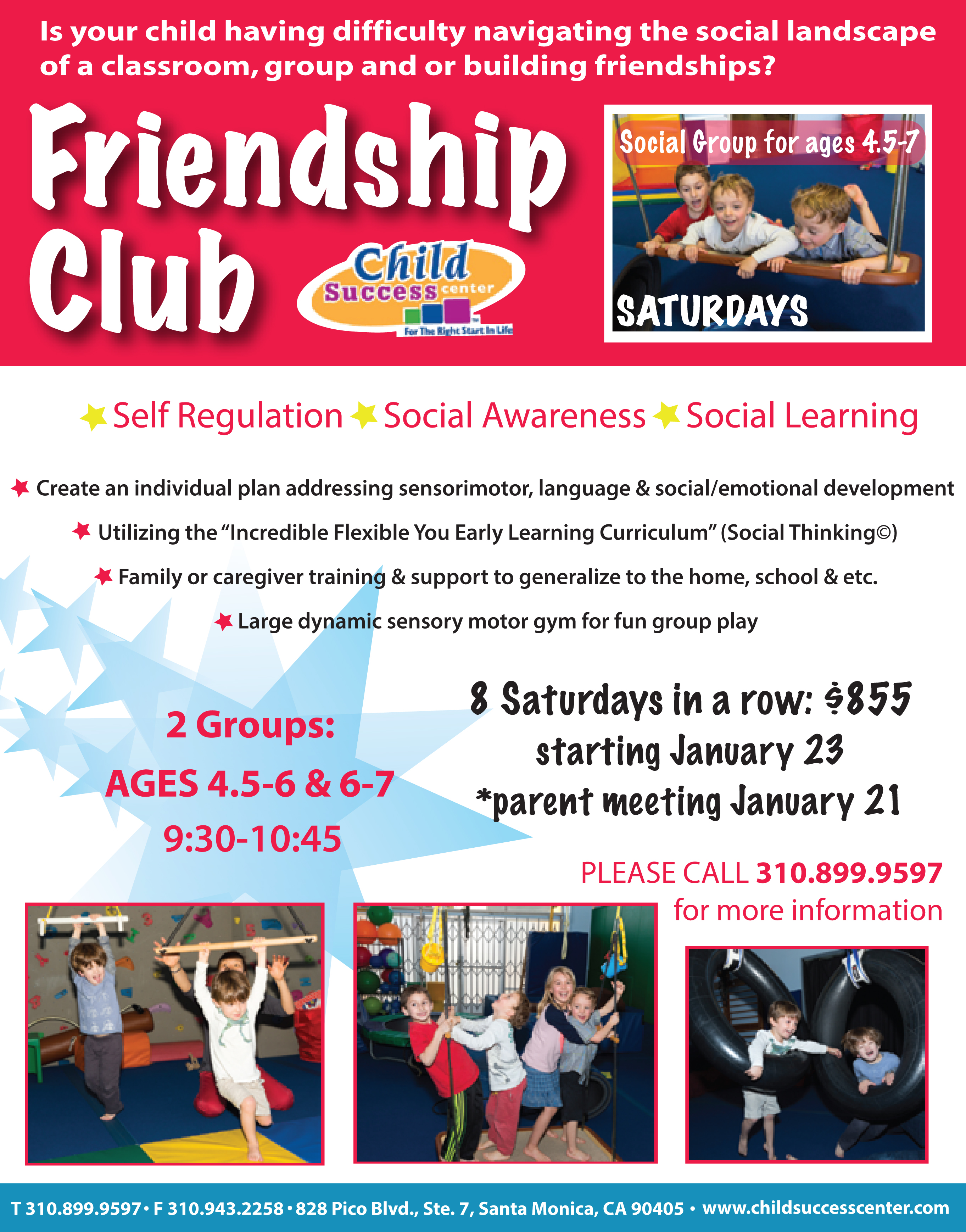early childhood development
Summer Camp 2019 – A Look Back
Every year, with the weather warming and the anticipation of the end of the school year, our CSC team looks forward to the summer camp program. Our Kindergarten Camp is always a favorite, and this year we added the Summer Brain Building Camp, which proved to be great fun for the kids and us!
Kindergarten Enrichment Summer Camp
K-Camp is such a joyful experience for the campers. For many of them, this is their first “camp” experience. That, combined with the anticipation of entering Kindergarten, creates excitement and glee for the children as they embark on their social learning journey.
While playing and making new friends, each camper was actually being challenged to build their capacity for adaptation and flexibility, supporting transitions between our sensory gym and classroom-like environments.
At the outset, each child engendered mindful attention, active listening, and presence to sculpt a grounded infrastructure. Such practices created a platform for social and emotional balance and regulation that promoted “whole body and brain” listening and engagement.
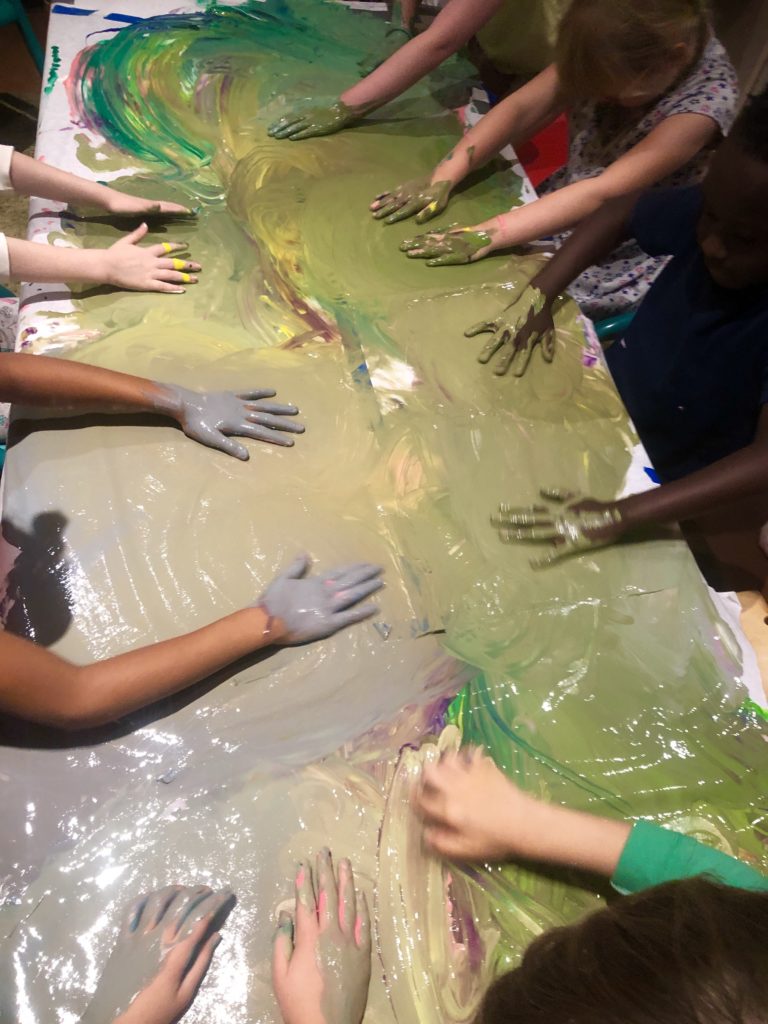 Our focus on learning stemmed from an array of structured, tabletop activities, to less structured, independent tasks that included sound/letter identification and pairing, rhyming, handwriting, word creation, and initial reading practices.
Our focus on learning stemmed from an array of structured, tabletop activities, to less structured, independent tasks that included sound/letter identification and pairing, rhyming, handwriting, word creation, and initial reading practices.
Through a social-emotional lens, we explored group plans and dynamics, problem-solving, expected and friendly ways of being, the sense of belonging, and further developed confidence and competence. Taking a look inward and building on self-reflective practices and attunement, each child began to expand their self-awareness and interpersonal skills. Through such dynamics emerged a child’s sense of openness, curiosity, and creativity to explore and build pathways for learning and academics, motor skill development, play, and social-emotional integration.
Whew! That said, the kids had a blast laughing, playing, giggling, and making friends and memories. Good luck new kindergarteners – you got this!
Social Brain Building Summer Camp
New this year to CSC’s summer camp program, was Social Brain Building Camp. Designed for children entering 1st grade in the fall, this camp invites children to exercise their imaginations, and role play while having fun building dynamic social skills that prepare them for successful relationships in 1st grade…and life!
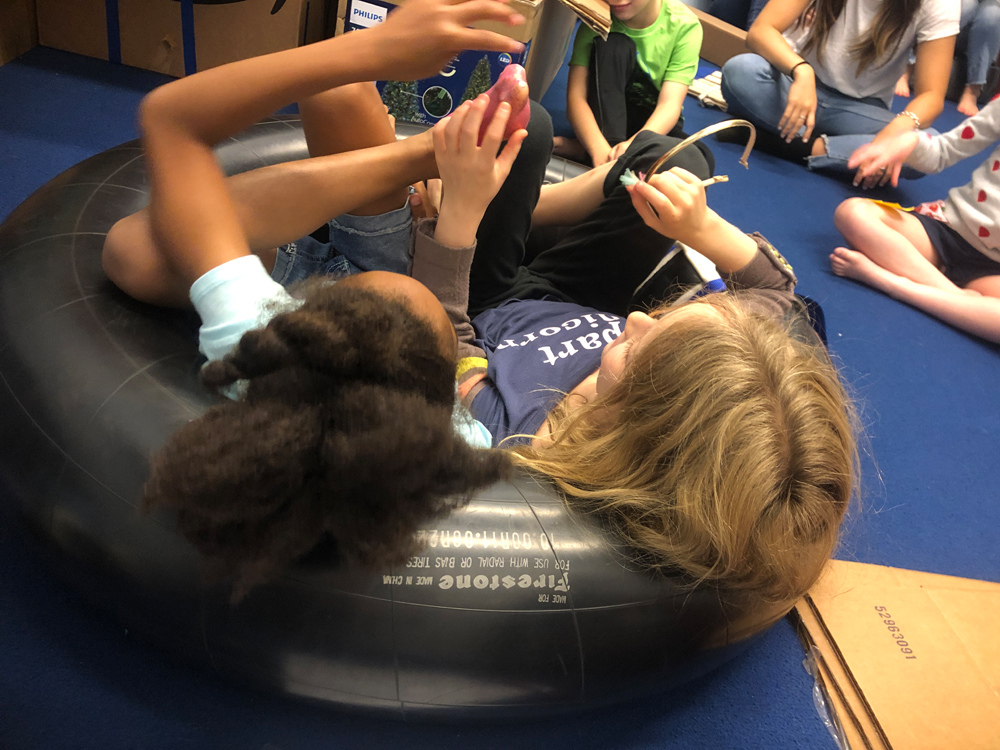 Campers attending CSC’s Social Brain Building Camp embarked on their social-emotional journey with eagerness to make new friends, enjoy physical activity, and learn the fundamentals of “we-thinking”. These were big challenges that the group worked on through various fun activities, including building a rocket ship to go to the moon, painting and coloring emotions, playing board games, watching interactive social skills videos, having a shaving cream party, and performing space man exercises.
Campers attending CSC’s Social Brain Building Camp embarked on their social-emotional journey with eagerness to make new friends, enjoy physical activity, and learn the fundamentals of “we-thinking”. These were big challenges that the group worked on through various fun activities, including building a rocket ship to go to the moon, painting and coloring emotions, playing board games, watching interactive social skills videos, having a shaving cream party, and performing space man exercises.
The camp’s goal was to develop social and emotional balance, regulation for first time listening, and cooperative conversational skills. Taking a look inward and building on self-reflective practices and attunement, each child began to expand their self-awareness and interpersonal skills. Campers began to take charge of their own emotions by identifying their feelings, utilizing the “take a break space” when needed for re-centering, and using their words to communicate their needs to peers.
Each week helpful hints were sent to parents to support and encourage ongoing social learning within the home.
Overall, the children at both camps, created a toolbox that shaped the development of the brain and body, enhancing capacity for social relationships, emotional experiences, and cognitive opportunities on the learning journey.
Tips For a Successful Transition Back to School
Back to school tips to make the transition easier on the whole family.
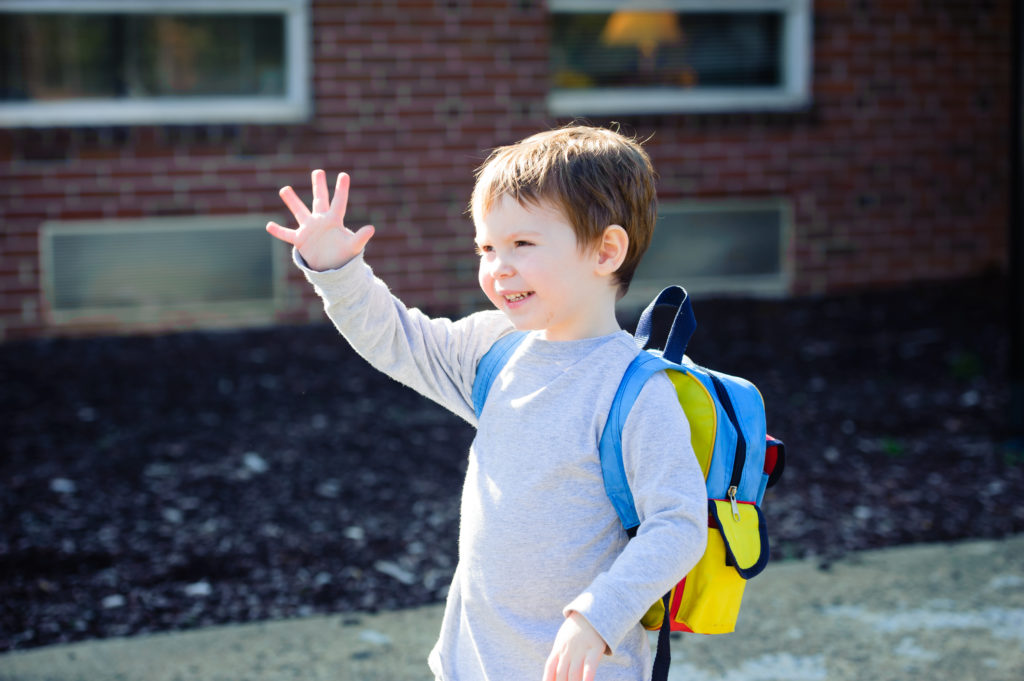
With school about to resume after the long summer break, now is the time to put wheels in motion for a smooth transition to the back to school routine. These back to school tips will benefit the whole family.
Morning Routine
First and foremost on parents’ minds is likely some dread thinking about the “morning routine” of school time. Two weeks prior to the start of school, establish school appropriate bedtime and wake up times, and practice going to bed and waking up at those times. Determine what the school morning will look like for each member of the family. Don’t use words alone – try using visual schedules to illustrate routines. A checklist with added visuals helps children learn how to self assess if they have completed what is expected of them. Every child wants to succeed, and feeling successful with the morning routine is no different.
Who will prepare breakfast and lunch?
Make sure to leave enough time in the morning routine for eating breakfast or preparing healthy smoothies to go. Start planning breakfast and lunch options a couple of weeks before school starts too, especially if your child is a picky eater. Explore ways your child can learn to make their own healthy lunches with plenty of fruits, crunchy veggies and protein to fuel their brain throughout the day.
Transition of movement
As kids head back to school, it’s important for parents to understand that their child’s nervous system is going to go through a transition while their body gets used to having less active movement throughout their day. Summer time fun involves a lot of whole body big movement play. School time requires more small motor tabletop play and learning experiences. This shift in body movement can cause a child to get fidgety or anxious. Try not to increase this anxiety by emphasizing they should “sit still”, “be good”, or “pay attention”. Make sure they get a good amount of active movement during after school hours.
If your child has been seeing an occupational therapist working on strategies to support attention and regulation, or if there are certain words that help your child connect to whole body listening, share those strategies and words with your child’s teacher prior to the commencement of the school year.

Much of the tabletop play and learning will involve writing or drawing. The small motor skills required for both are not necessarily automatic and easy for all children. Watch how your child picks up and holds a marker or pencil, and if they experience joy or avoidance responses when doing so. If you notice a tendency towards avoidance, manipulation seems awkward or encumbered, or if their desire to do age appropriate drawing and writing does not develop, seek advice from a pediatric occupational therapist as early as possible.
Sensory Overload
The classroom environment may have a lot more sound and visual stimulus than a child might experience during a typical summer break day, as well as many more people in their immediate space. For some children, this additional sensory activity is joyful, but for those with sensory processing challenges, these circumstances can heighten the stress response. Be aware and observe your child as he transitions into these new situations, and appreciate how his/her brain may be working to modulate and process the incoming sensory information.
Children can also be overwhelmed by the amount of oral communication they have to process during a school day. They need to fire up their listening skills to follow direction, and their memory systems need to respond and perform in an expected manner in a group all day. Whew, that’s a lot! Don’t be surprised if they struggle with following directions and listening when they get home at the end of the day. Watch for chewing of shirt, pencils and other nonfood items – this is a sign that their nervous systems is needing help to regulate. Keep this in mind for the first couple of weeks and try not to overload them with too many additional directions.
Communication
![]() School requires children to be sharing thoughts and ideas, and following direction utilizing their language processing brains all day long. If they are struggling in any of these areas and if they were a late talker, seek a speech and language evaluation to gain insight into language processing, before social, emotional, or reading/spelling concerns develop as well.
School requires children to be sharing thoughts and ideas, and following direction utilizing their language processing brains all day long. If they are struggling in any of these areas and if they were a late talker, seek a speech and language evaluation to gain insight into language processing, before social, emotional, or reading/spelling concerns develop as well.
Speech intelligibility is a developmental process. Knowing when your child should be saying “s”, “l” and “r” sounds, to name a few, correctly can be confusing. This chart can be referenced as a guideline.
Finally, you and your child will feel tired as you transition sleep patterns and routines back to school. Be kind to both of your nervous systems and don’t over schedule your child’s after school activities. Some down time is a good thing – for both of you.
What Your Child May Experience in an Occupational Therapy Session
An occupational therapy session is work for a child’s brain, disguised as play.
A child’s “occupations” include everything he or she does throughout the day – the “jobs of childhood” – the most important jobs being playing, socializing, and learning. The purpose of pediatric occupational therapy is to help a child become comfortable, independent, and proficient in these areas of their lives.
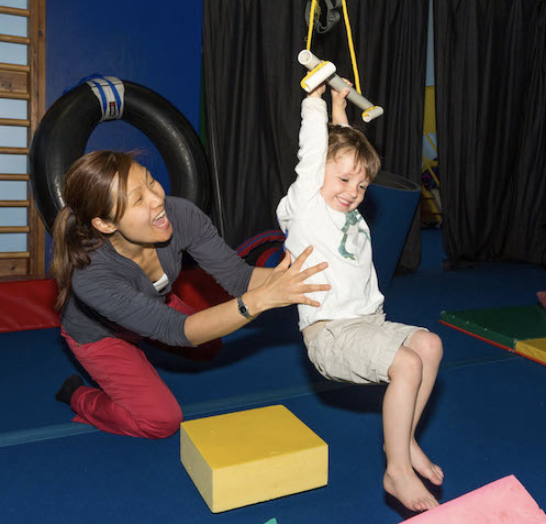 Occupational therapy addresses a variety of areas of deficits including fine motor skills, gross motor skills, social emotional skills and sensory integration. Initial therapy sessions help the therapist to understand the unique wiring of the individual child’s brain and nervous system. The therapist will consult with the child’s parents to ascertain what home and school life are like for the child, and what they have observed in their child’s development. This evaluation and analysis process will continue across subsequent sessions as the child’s nervous system develops.
Occupational therapy addresses a variety of areas of deficits including fine motor skills, gross motor skills, social emotional skills and sensory integration. Initial therapy sessions help the therapist to understand the unique wiring of the individual child’s brain and nervous system. The therapist will consult with the child’s parents to ascertain what home and school life are like for the child, and what they have observed in their child’s development. This evaluation and analysis process will continue across subsequent sessions as the child’s nervous system develops.
Each occupational therapy session is tailored to meet the child’s specific needs, facilitated in a warm and comfortable environment, and created to reflect the child’s interests.
Sensory processing, or organizing, is how a child learns and experiences the world around him. “Just right” sensory experiences during the therapy session will help the child with emotional regulation, self-regulation and social engagement. Intact sensory integration provides the fundamental building blocks for attention, emotional development, motor skills development and higher-level academics and social skills.
An occupational therapy session, utilizing a sensory integration treatment approach, will often target the social-emotional system, employing the Zones of Regulation, Floortime and Social Thinking® (Attributed to Michelle Garcia Winner as creator of the Social Thinking Methodology) programs. Covered would be social skills concepts such as staying with the group, taking turns, collaborative play, and interacting with peers and adults, in order for children to be successful in relationships and group environments.
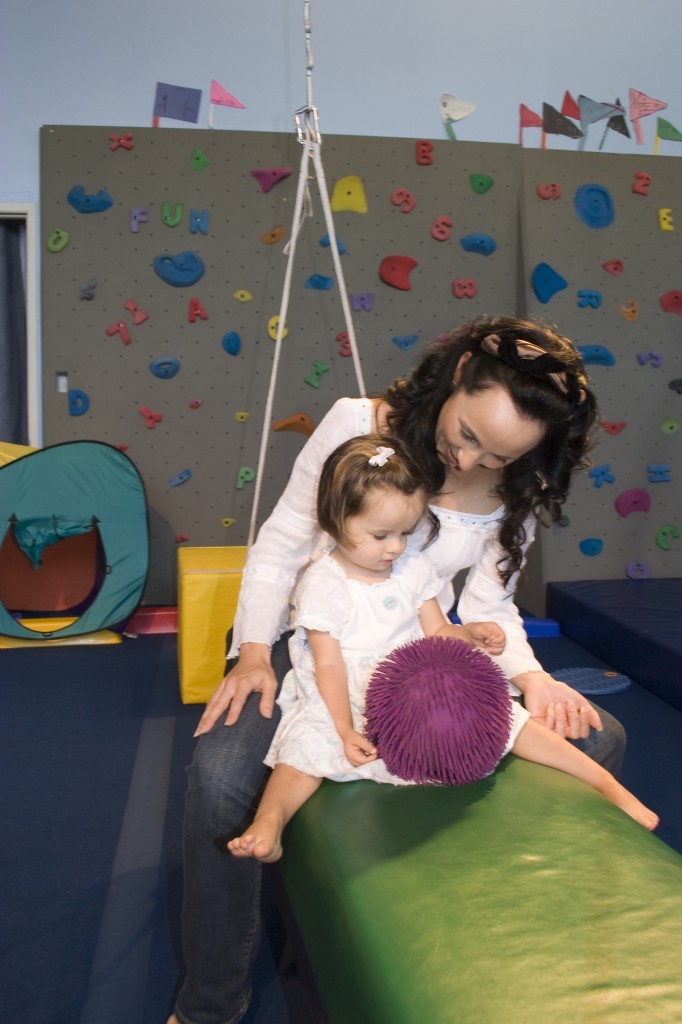 Occupational therapy may work on fine motor skills such as grasp and in-hand manipulation, necessary for drawing, coloring, folding and cutting. Visual motor integration, the ability to use the visual system and the fine or gross motor systems together, and essential to activities such as handwriting, ball play and sports, may be addressed.
Occupational therapy may work on fine motor skills such as grasp and in-hand manipulation, necessary for drawing, coloring, folding and cutting. Visual motor integration, the ability to use the visual system and the fine or gross motor systems together, and essential to activities such as handwriting, ball play and sports, may be addressed.
An OT session might include work on gross motor skills that are involved in playing sports that require bilateral coordination, ball skills, strength, coordination and balance. The therapist will provide easy and creative activities and exercises to help increase upper body and core strength necessary for postural stability, balance, coordination, gross and fine motor control and will often provide a home-based program for follow through.
Often, children who struggle with Sensory Integration and are referred to Occupational Therapy have challenges with Executive Function Skills, necessary for learning and development. In order for a child to plan and organize what they need to do throughout the day, such as getting homework done, they need to be able to focus attention, filter distractions, remember and perform multi-step directions.
Occupational therapy is work for a child’s brain, disguised as play. All children engaged in occupational therapy experience a new level of confidence and self-esteem that comes with learning a new skill or overcoming a challenge. The smile on their face will say it all.
This program, including its teacher or leader, is not affiliated with, nor has it been reviewed, approved, or endorsed by Michelle Garcia Winner and Think Social Publishing, Inc.
When Parents Need More Support With a Child’s Challenging Behavior
What are Behavior Therapy Services?
Parenting Techniques and Family Work
Some children are more challenging to parent than others. Parents with multiple children say, “It wasn’t like this with my other kids”, or first time parents say, “My friends don’t seem to have the same problems that we are having.” A set of parenting techniques used with one child may not necessarily work with another, based on individual differences in temperament, behavior and developmental challenges.
There are research-based techniques that can provide help with the understanding and application of positive behavioral strategies for your child. Topics include positive discipline techniques, difficult behaviors at home and at school, positive praise and attention, providing effective directions and transitional warnings, how to create and maintain a home-based token system, and effective conflict resolution and problem solving with your child. For most families, behavior therapy begins with a series of meetings with parents to create a foundation for behavior interventions.
Individual Behavior Therapy – Child Based
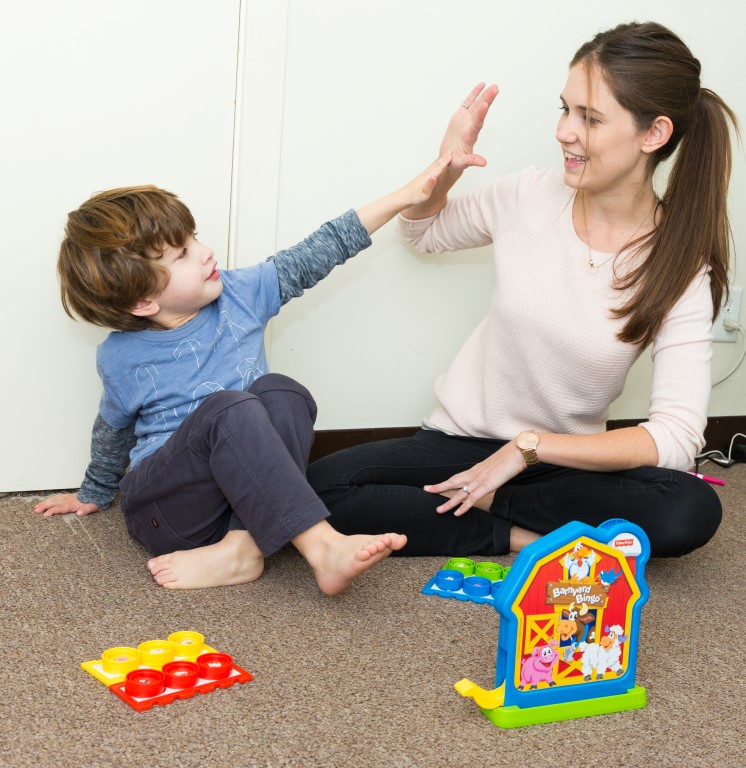 Once at least two parent meetings are complete, our therapists can provide individual behavior therapy for your child. This therapy is generally play based and uses the Social Thinking® (Attributed to Michelle Garcia Winner as creator of the Social Thinking Methodology) curriculum to explore social concepts. Individual Behavior Therapy is recommended for children that have a difficult time emotionally regulating in a group, separating from parents, or require more individual attention in learning and practicing social concepts than they would in a group setting. Once a child has completed between 4-12 individual sessions, it may be recommended they practice their skills in a therapeutic two-person play session, or a group setting. During these sessions, occasionally parents may be asked to join in on part of the session.
Once at least two parent meetings are complete, our therapists can provide individual behavior therapy for your child. This therapy is generally play based and uses the Social Thinking® (Attributed to Michelle Garcia Winner as creator of the Social Thinking Methodology) curriculum to explore social concepts. Individual Behavior Therapy is recommended for children that have a difficult time emotionally regulating in a group, separating from parents, or require more individual attention in learning and practicing social concepts than they would in a group setting. Once a child has completed between 4-12 individual sessions, it may be recommended they practice their skills in a therapeutic two-person play session, or a group setting. During these sessions, occasionally parents may be asked to join in on part of the session.
How Does Behavior Therapy Help at Home and at School?
Each child and family is different, and requires different techniques and tools. The number of sessions above, indicate the average numbers of sessions for behavior intervention. In order for behavior to change and generalize between settings, it is important to have effective communication between the adults in your child’s life. The more consistent all of the adults in a child’s life are, the faster change is able to happen. Being consistent becomes the most challenging part of behavior therapy for parents. Receiving behavior therapy interventions can be equated as having a personal trainer at the gym. They hold you accountable for the behavior “work outs” that your family is going through, and provide support during the difficult times when you want to throw in the towel. Once a positive behavior system that works for your child is in place at home, often times that same or similar system can be implemented in school to support your child.
Learn more about Behavior Therapy at Child Success Center.
This program, including its teacher or leader, is not affiliated with, nor has it been reviewed, approved, or endorsed by Michelle Garcia Winner and Think Social Publishing, Inc.
Executive Function – the Key to Success
Executive Function – Helping Your Child Create the “Recipe for Success” this School Year.
Melissa Idelson, Director of Child Success Center, recently spoke at the Child Success Foundation’s “Outside the Box” Child – Educational Conference in Culver City, California. She and her speaking partner, Dr Jayme Neiman-Kimel, Ph.D, shared their thoughts on how to help children who struggle with Sensory Processing Disorder (SPD), attention issues and lack Executive Function skills, organize their worlds, learn to self regulate and develop the skills needed to move towards independence.
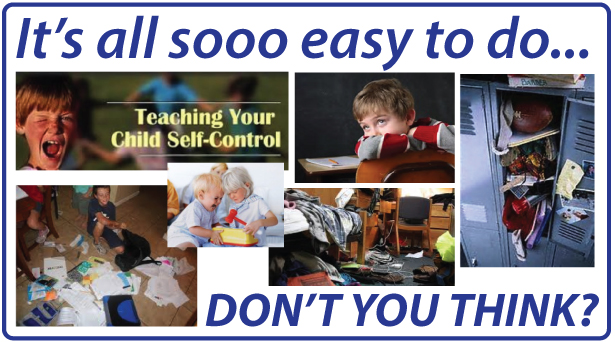
Children with SPD, ADHD and Executive Function deficit may exhibit similar behaviors such as impulsivity, frustration, biting/pushing/hitting, difficulty going to school or maintaining friendships, immaturity, sleep difficulties, poor personal space recognition, and may be hard to parent. Any of these behaviors can hinder your child from effectively doing his “jobs of childhood” – that of learning to collaborate his physical, social/emotional and communication/language platforms with his environment and peers in order to prepare his brain for a higher level of learning. This collaboration, known as Executive Functioning, is a set of processes, or neurologically-based skills, that all have to do with managing oneself (mental control and self-regulation) and one’s resources in order to achieve a goal.
While we tend to assume that all children are born with the capacity to excel in the “jobs of childhood”, the reality is that about 20% will encounter challenges substantial enough to require intervention – and the earlier the better. Getting this early intervention begins with parents being aware of their child’s challenges and seeking professional assessment.
The recipe for success begins with an intake session with a professional to determine the “ingredients”, or the challenges the child is experiencing, and the behaviors the child is exhibiting. Then an assessment is made and a program of appropriate interventional therapies with a therapeutic specialist is created. From these therapy sessions the child will acquire the tools needed for a successful outcome.
For the preschool aged child, a combination of occupational therapy and speech therapy is often recommended. For older children, educational therapy can be added to the mix, utilizing a team based/whole child approach. Social Learning, a program for all age groups used here at Child Success Center, provides practical frameworks, strategies, activities, and vocabulary to help improve social skills.
Learning Executive Function skills is a process that begins in the pre-school years. It is important that parents observe their young child and take notice of areas where there is consistent difficulty. However, during any stage of a child’s development, if a parent notices signs of struggle or frustration, that is the time to seek an appropriate assessment.
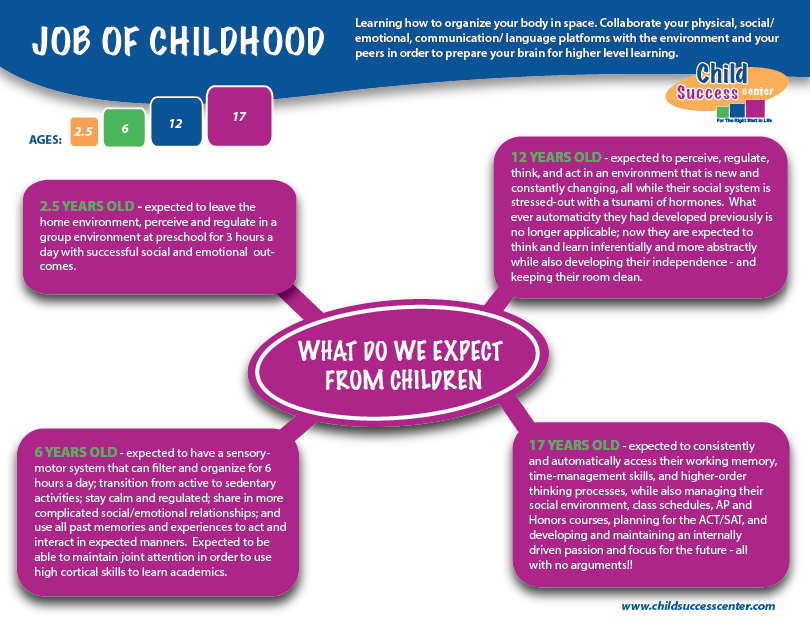
Learn more about what to look for in your child, how each of the therapies are facilitated, the programs offered at Child Success Center, and how we can help your child achieve his successful outcome.
Occupational Therapy – Learning the “Jobs of Childhood”
Which Children Benefit from Therapeutic Services?
Friendship Club Social Skills Enrichment Program
“Social Skills” and Early Childhood Development
Social skills plays a significant role in learning development and the educational experience.
One might correctly assume that Social Thinking® (Attributed to Michelle Garcia Winner as creator of the Social Thinking Methodology) is the process by which we interpret the thoughts, beliefs, intentions, emotions, knowledge and actions of another person along with the context of a situation to understand that person’s experience or perspective, and how to react accordingly. But Social Thinking® skills also play a significant role in learning development and the educational experience.

Learning instances can provide a number of potentially challenging “social” situations – group interactions, self-regulatory expectations, knowledge of body awareness, social exchanges and an understanding of listening. By using the social thinking model, we promote growth in areas that are critical for a learning foundation and are vital to successfully managing many life endeavors and day-to-day situations.
If a child is feeling socially uneasy, struggles to verbalize and identify needs, feels disconnected within a group or has trouble self-regulating, that child may find it difficult to learn and derive meaning from learning experiences. These situations arise daily for so many children, and if social skills are left un-addressed, a child can fall further and further behind socially and academically, creating loss of self-esteem and creative potential.
We expect children to enter into a multitude of situations, some new, some routine, and our goal is for them to have the skills to thrive and find themselves successful, comfortable and confident in doing so. Social thinking development provides this opportunity for success.
Child Success Center’s Friendship Club is designed for the child, ages 5-8, who is having a difficult time navigating the social landscape of the classroom or group setting and/or building friendships. The program is designed to use a multimodal approach of positive reinforcement, flexible behavior systems, floor time aspects, mindfulness practices, and the Social Thinking®curriculum, “We Thinkers – Social Explorers™” for early learners.
This program, including its teacher or leader, is not affiliated with, nor has it been reviewed, approved, or endorsed by Michelle Garcia Winner and Think Social Publishing, Inc.
Social Skills Learned at Friendship Club – Session Starts Saturday, January 23, 2016!
The Child Success Center Friendship Club is designed for the child ages 4-7 who is having a difficult time navigating the social landscape of a classroom or group and/or building friendships.
For these children, growing and learning to engage with others in their universe can be confusing and/or overwhelming, and undesired behavior may emerge or the child may become isolated. Research shows that a common language, similar boundaries, and expectations of a child across all environments aides a child in feeling safe and increasing desired behaviors.
Friendship Club provides opportunities through physical play experiences that help a child fill his or her tool bag with skills. Our large sensory motor gym provides the setting for engaged learning through a variety of fun gross motor activities, including swings, rock wall, zip line, trampoline, pillow pit, monkey bars and more!
Friendship Club uses aspects of floor time and adult-led play to foster comfort for children when engaging with others. It will build upon their current social knowledge and challenge them to grow past parallel play – using their words in sharing, turn-taking, and dramatic play. We also ask for parental involvement in order for the child’s behavior to generalize to their everyday life. We will provide you and your family with tools that will make play dates, parties, and social interaction easier for everyone. An adult will be asked to attend the end of each camp day in order to learn what “tools” we put in the social skills toolbox that day, and how to implement these tools at home. Learn more>
Our next session of Friendship Club begins Saturday, January 23, 2016 – enrollment is now open. Call the Child Success Center at 310.899.9597 for more info or to enroll.
